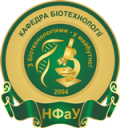My name is Olena Chabanenko. I currently work as a junior researcher at the Department of Cryocytology at the Institute of Problems of Cryobiology and Cryomedicine of the National Academy of Sciences of Ukraine. I am a graduate of the Faculty of Industrial Pharmacy, Management and Administration of the National University of Pharmacy (2016). I studied for a master’s degree at the Department of Biotechnology, obtaining a full higher education in Pharmaceutical Biotechnology, which allowed me to continue my scientific path and improve my educational and qualification level. In 2021, she defended her dissertation on “The reaction of mammalian erythrocytes to post-hypertensive shock and removal of cryoprotectant after freezing” and received her doctorate in 091 – Biology.
The results of scientific research are widely presented at scientific and practical conferences of various levels: the conference of young scientists “Cold in Biology and Medicine” of the IPKiK together with the UNESCO Chair, international conferences “CRYO 2020”, “CRYO 2022”, etc. In 2018, she received a grant from the Society for Cryobiology. In 2022, she won the competition for a scholarship of the President of Ukraine for young scientists.
Currently, I have 36 scientific papers: 10 articles in scientific professional journals (4 of them are cited in the international Scopus database), 1 utility model patent, a monograph chapter and 24 abstracts.
During my studies at NUPh, I gained significant experience that helped me in my future career. The Department of Biotechnology teaches many interesting disciplines. Among them, I was most fond of the following disciplines: “Modern Biotechnologies of Drug Production”, “Modern Problems of Biotechnology”, “Planning and Organization of Scientific Research”, “Information Technologies in Science”.
The knowledge and skills acquired during the study of the disciplines “Planning and Organization of Scientific Research” and “Information Technologies in Science” are now useful to me. Nowadays, a necessary condition for successful scientific activity is readiness for research work, so the block of disciplines “Methodology of Scientific Research” taught me how to conduct scientific research, analyze the results of experiments, choose optimal solutions, prepare and compile reviews, reports and scientific publications, and so on.
It should be noted that the students were also impressed by the practical classes, which were held with the use of discussions, game tasks, interactive technologies, and not just in the form of writing essays, etc. There were not enough English classes, because fluency in a foreign language always requires practice. Therefore, I would recommend adding an English language course to the educational program. The teachers of the department never refused to give advice and supported me at every stage of my studies.
Chabanenko Olena



